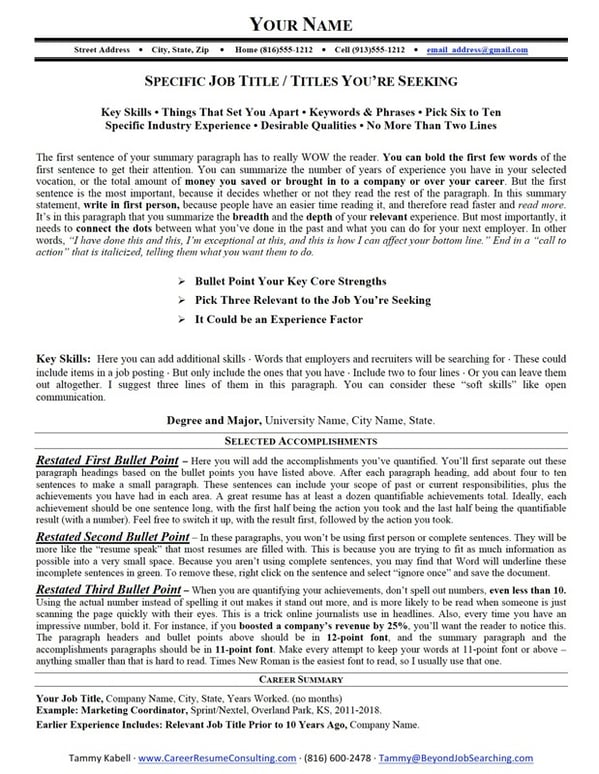

Resume Tips From an Expert
And a Special Gift to Help You Write Them Into Your Resume!
Here's How to Use Your Resume to Build Your Brand
Why “build a brand” in the first place? Well, let’s face it – until your next boss or any gatekeeper (like an executive recruiter) gets to know you, you’re nothing but a commodity.
Therefore, you need to create for yourself what marketing calls a Unique Selling Proposition (USP), or a value proposition. In other words, you need to tell an employer why they should call YOU instead of the candidates with just as much or more relevant experience.
Your USP is your unique combination of skills, strengths, experience and education – it’s this combination that no one else has. And you need to define your USP in your resume, which is your “30 second commercial” to a potential employer. Employers and recruiters may receive 80 to 150 resumes at a minimum (and this year, it's more like hundreds) for every position posted.
In fact, marketing-leading companies everyone has heard of can receive over 1000 applications! Therefore, it is imperative that you set yourself apart. Keep in mind, the resume’s job is not to get you a job; its goal is just to get you that first phone call.
In your resume, you should state in no uncertain terms what you can do for the reader and their company. It’s not about what you want – “I’m looking for a position that can utilize my strengths and can offer me career potential….” Scratch that!
Your summary statement should be all about what you offer them – “Having grown my market territory by 42% in the last two years, I have developed a systematic approach to business development that shortens the sales cycle and can affect your bottom line in a matter of months…” It should immediately be apparent to your next Direct Manager that hiring you would be a safe bet.
Embarking on the quest for a position with a six to seven-figure salary often calls for a strategic overhaul of your current resume, stripping away any elements that don't align with your job search goals.
Here are 10 things you shouldn’t have in a professional resume. Take these things off of your current resume today to get a better response:
- Any detailed job history past 10-15 years, or putting a date on any accomplishment or job more than 15+ years old (it’s not as relevant and may hint at your age)
- Any past salary
- Dates of graduation from college
- Anything regarding high school graduation – if you don’t have any college, only list certifications, programs you've attended, or nothing regarding education
- Beginning and ending months of employment – only put years
- Just a list of job duties or job responsibilities – hiring managers don’t want a job description. They want to know what you actually accomplished in the job – achievements, achievements, achievements! So, what did you do that went above and beyond just showing up for work every day?
- Personal stuff—hiring managers don’t take the time to read it, and it’s not relevant to their bottom-line impacts. If you have ever hired someone, did you ever reply to an application/resume that shared that the candidate loves skiing? (Probably not.) You can always bring up commonalities in the interview.
- References – the time and place are later, after a successful face-to-face interview, or if they ask for them, whichever comes first.
- “References upon request” – everyone knows they are, so don't waste precious resume real estate with those words.
- Three or more pages – you have 6 to 10 seconds of someone’s attention, so it needs to read like a 30 second commercial – give them a teaser so that they’ll call you to find out more!
7 characteristics of a good resume:
- The initial contact resume should ideally be one page in length - an executive summary of your accomplishments and scope of impact.
- Begin your resume by clearly stating the job title or titles you're aiming for – this sets the stage for the reader, clarifying your career goals and the level of responsibility you're ready to assume. This strategic placement ensures that the reader interprets everything that follows through the lens of your desired role.
For instance, when you express interest in a senior leadership position, such as approaching a CEO to serve as their right-hand executive, every subsequent detail on your resume will be evaluated in the context of your potential as their Chief Operating Officer. - Your resume must be scanning-ready with keywords related to the jobs you want.
- The 1st third of your resume must be a summary of how you have either made a company money or saved a company money, and connect the dots for the employer by telling them how you can do the same for them.
- Your resume must avoid revealing any liabilities, such as age, long gap in employment, job hopping, etc.
- Your resume must sell transferable skills and experience factors.
- The resume must present a first-class image.
And to make sure YOUR resume rises to the top of the stack, try this:
Get your copy of the Resume Template PDF above. Unlike the sample resumes you can receive on this website, this Resume Template explains to you EXACTLY what to write on every single line of your own resume (if you choose to write it yourself).
Just understand that most employers expect someone searching for a Director-level position or above to have a professionally written resume, not a homemade one.
Requesting your copy at the top of this page will give you instant access to this template. You can also click the button below to set up a time to talk with one of our team members (NOT a salesperson).
Download the Resume Template:
Know exactly what to write on every single line of your resume, simply by following the instructions in this FREE one-page pdf.

